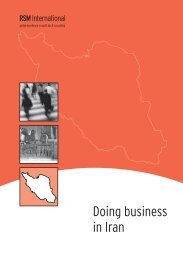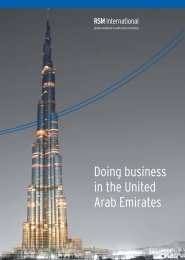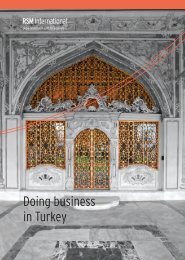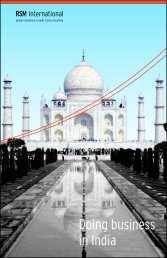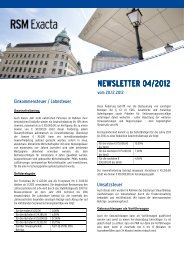Doing Business in France - RSM International
Doing Business in France - RSM International
Doing Business in France - RSM International
Create successful ePaper yourself
Turn your PDF publications into a flip-book with our unique Google optimized e-Paper software.
3.7.3 Employee treatment <strong>in</strong> <strong>France</strong><br />
Schonbrunn Palace,<br />
Vienna<br />
Salaried activity <strong>in</strong> <strong>France</strong> is subject to French labor regulations, particularly<br />
concern<strong>in</strong>g statutory work<strong>in</strong>g hours, payment of French social security contributions<br />
(<strong>in</strong> the absence of applicable agreements) and equal rights.<br />
3.7.4 Health cover for personnel <strong>in</strong> <strong>France</strong><br />
Your employees may opt for cont<strong>in</strong>ued cover by the health and social security system<br />
<strong>in</strong> their home country if a reciprocal agreement exists between their home country<br />
and <strong>France</strong>.<br />
In the absence of a reciprocal agreement, any salaried employee work<strong>in</strong>g <strong>in</strong> <strong>France</strong>,<br />
irrespective of their nationality, age or type of employment contract, must be<br />
registered with the French social security system (territorial pr<strong>in</strong>ciple).<br />
<strong>International</strong> agreements and EU regulations provide for exemptions from French<br />
social security contributions.<br />
Nationals of countries which have signed bilateral agreements with <strong>France</strong> may<br />
rema<strong>in</strong> registered with the social security system of their country of orig<strong>in</strong> dur<strong>in</strong>g<br />
their secondment <strong>in</strong> <strong>France</strong>.<br />
A secondment is always limited <strong>in</strong> time and at the end of this period the seconded<br />
national must register with the social security system of the host country (<strong>in</strong> this<br />
case, <strong>France</strong>). They can however cont<strong>in</strong>ue to contribute to the social security system<br />
<strong>in</strong> their country of orig<strong>in</strong>; this is called mak<strong>in</strong>g dual contributions.<br />
In practical terms, the employee must supply proof of their registration <strong>in</strong> their<br />
country of orig<strong>in</strong> to be able to benefit from the application of social security bilateral<br />
agreements.<br />
DOING BUSINESS IN FRANCE | 21



